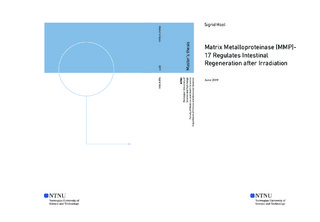Matrix Metalloproteinase (MMP)-17 Regulates Intestinal Regeneration after Irradiation
Master thesis
Permanent lenke
http://hdl.handle.net/11250/2613169Utgivelsesdato
2019Metadata
Vis full innførselSamlinger
Sammendrag
The intestinal epithelium is a multitasking tissue and has a large flexibility to adapt to different types of insults. This is mostly due to the proliferative intestinal stem cells (ISCs) at the bottom of the intestinal crypt, which are highly dependent on cues and signals from surrounding cells. The smooth muscle cells (SMCs) of the muscle layers in the intestine have recently been suggested to act as a possible regulator of ISCs. The SMCs have further been identified to specifically express Matrix Metalloproteinase (MMP)-17, a protease which has been shown to be involved in several diseases and pathologies. However, the role of SMCs and MMP17 in the intestine remains unknown. Here we demonstrate a function of MMP17 during the repair process following the loss of ISCs, caused by radiation exposure. We found that the lack of MMP17 caused impaired regeneration through sustained damaged and structural alterations in the ileum 3 and 6 days after irradiation. We in addition observed a potential decrease of proliferative cells at the bottom of intestinal crypts 6 days after irradiation in mice lacking MMP17. Furthermore, we found that the lack of MMP17 led to a decreased expression of an ISCs marker under homeostatic conditions. With this, our results demonstrate a role for MMP17 in both homeostasis and regeneration following radiation exposure. Furthermore, since the irradiation induces a low inflammatory response, the possibility of MMP17 cleaving substrates important for regulation of the inflammatory response to injury can be rejected. However, further work is needed to specify the substrates and signaling pathways in which this protease interacts. The characterization of MMP17 in the intestine is of high interest, as it could be used as a therapeutic target in gastrointestinal diseases and cancers.
